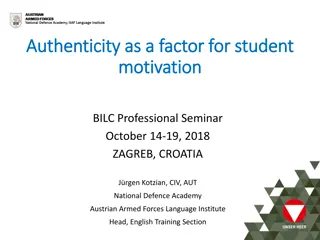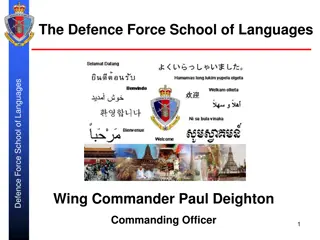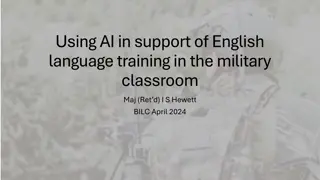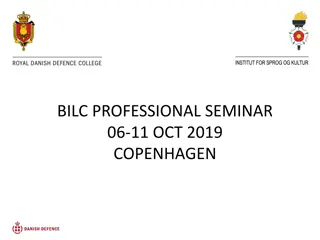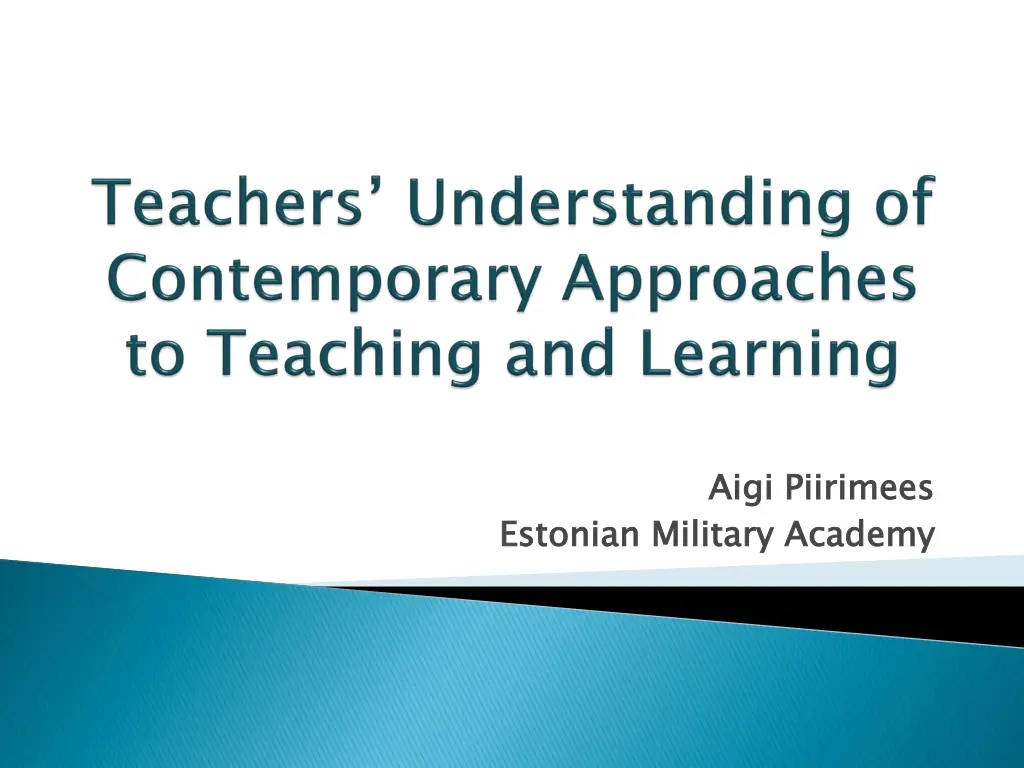
Educators' Impact on Teaching Quality and Student Learning
The entire educational process, including content selection, teaching methods, and interaction with learners, is shaped by educators' beliefs. Teachers' philosophies are closely tied to teaching quality, a crucial factor influencing student learning. Changes in the labor market, leadership in school life, self-fulfillment, learning skills, and societal shifts all play roles in learner development. This article delves into the critical aspects of education, touching on various factors influencing teaching practices and student outcomes.
Download Presentation

Please find below an Image/Link to download the presentation.
The content on the website is provided AS IS for your information and personal use only. It may not be sold, licensed, or shared on other websites without obtaining consent from the author. If you encounter any issues during the download, it is possible that the publisher has removed the file from their server.
You are allowed to download the files provided on this website for personal or commercial use, subject to the condition that they are used lawfully. All files are the property of their respective owners.
The content on the website is provided AS IS for your information and personal use only. It may not be sold, licensed, or shared on other websites without obtaining consent from the author.
E N D
Presentation Transcript
Aigi Piirimees Military Academy Aigi Piirimees Academy Estonian Estonian Military
Focus Integration Teamwork Creative Key Ability Focus on Integration of Teamwork Creative and Key competences Ability to on the the learner of different learner different subjects subjects and and fields fields and critical competences to solve critical thinking thinking solve problems problems
The entire educational process: the selection of content, selection of teaching methods, development of instructional objectives, and interaction with the learners is influenced by the educators beliefs. (Boone et al., 2002) Teachers teaching philosophy is clearly connected with the quality of teaching, which in its turn is considered to be one of the most important factors influencing students learning. (Leijen, 2019)
Changes in the labour market market Changes in the labour Subject knowledge and Subject knowledge and skills skills Leadership and organisation of school life school life Leadership and organisation of Self-fulfilment Self-fulfilment Learning skills Learning skills Social changes changes Social Physical, mental and social learning environment environment Physical, mental and social learning Learning content and approach to learning learning Learning content and approach to LEARNER S DEVELOPMENT DEVELOPMENT LEARNER S Collaborative skills skills Collaborative Openness Openness Technologica l development Technological development Self-regulation Self-regulation Lifelong learning learning Lifelong Teacher training Teacher training Political choices choices Political Subjective well- being being Subjective well- Changing demand for education education Changing demand for Learning objectives objectives Learning Broader goals Broader goals School culture School culture Approach to learning, reasons for changing it, factors supporting changes in school culture, objectives and the broader goals of the changes Approach to learning, reasons for changing it, factors supporting changes in school culture, objectives and the broader goals of the changes The figure is based on the article: Heidmets, M., Eisenschmidt, E., Poom-Valickis, K. (2017). pik situs: teooriad, uurimused, m tmine. Anal tiline levaade
Changes in the labour market market Changes in the labour Subject knowledge and Subject knowledge and skills skills Leadership and organisation of school life school life Leadership and organisation of Self-fulfilment Self-fulfilment Learning skills Learning skills Social changes changes Social Physical, mental and social learning environment environment Physical, mental and social learning Learning content and approach to learning learning Learning content and approach to LEARNER S DEVELOPMENT DEVELOPMENT LEARNER S Collaborative skills skills Collaborative Openness Openness Technologica l development Technological development Self-regulation Self-regulation Lifelong learning learning Lifelong Teacher training Teacher training Political choices choices Political Subjective well- being being Subjective well- Changing demand for education education Changing demand for Learning objectives objectives Learning Broader goals Broader goals School culture School culture Approach to learning, reasons for changing it, factors supporting changes in school culture, objectives and the broader goals of the changes Approach to learning, reasons for changing it, factors supporting changes in school culture, objectives and the broader goals of the changes The figure is based on the article: Heidmets, M., Eisenschmidt, E., Poom-Valickis, K. (2017). pik situs: teooriad, uurimused, m tmine. Anal tiline levaade
Participants 4 English teachers, 1 Russian and English teacher, 1 French and English teacher Interview Preparing and conducting lessons, organising independent work, assessment, giving feedback Questionnaire Teaching practices What promotes or inhibits their application
Students in the planning process Flexible course plans Knowledge is constructed together with students Varying teaching methods Collaborative skills Group work Peer assessment Self-regulation Shared responsibility
Boone, H. N., Gartin, S. A., Wright, C. B., Lawrence, L. D., & Odell, K. S. (2002). Adult Education Philosophies Practiced By Agricultural Education Teachers In Pennsylvania, Virginia, And West Virginia. Journal of Agricultural Education, 43(3), 37 48 Estonian Lifelong Learning Strategy 2020 https://www.hm.ee/sites/default/files/estonian_lifelong_strategy.pdf Heidmets, M., Eisenschmidt, E., Poom-Valickis, K. (2017). pik situs: teooriad, uurimused, m tmine. Anal tiline levaade https://dspace.ut.ee/bitstream/handle/10062/55716/Opikasitus_Kirjanduse_ylevaade_TLY.pdf?seque nce=3&isAllowed=y Leijen, . (2019). li Leijen: mis teeb petaja edukaks k rgem vaimne v imekus, p hjalikud teadmised v i motiveeritus? https://heureka.postimees.ee/6674209/ali-leijen-mis-teeb-opetaja- edukaks-korgem-vaimne-voimekus-pohjalikud-teadmised-voi-motiveeritus Postareff, L. and Lindblom-Yl nne,S. (2008) Variation in teachers descriptions of teaching: Broadening the understanding of teaching in higher education. Learning and Instruction 18 (2008) 109-120. https://sisu.ut.ee/sites/default/files/opikasitus/files/postareff_lindblom- ylanne_2008._variation_in_teachers_descriptions_of_teaching.pdf The approach to learning and how it is changing Explanation of objective 1 of the Estonian Lifelong Learning Strategy 2020 https://edutech.mii.lv/wp-content/uploads/2018/11/New-learning- paradigm.pdf

